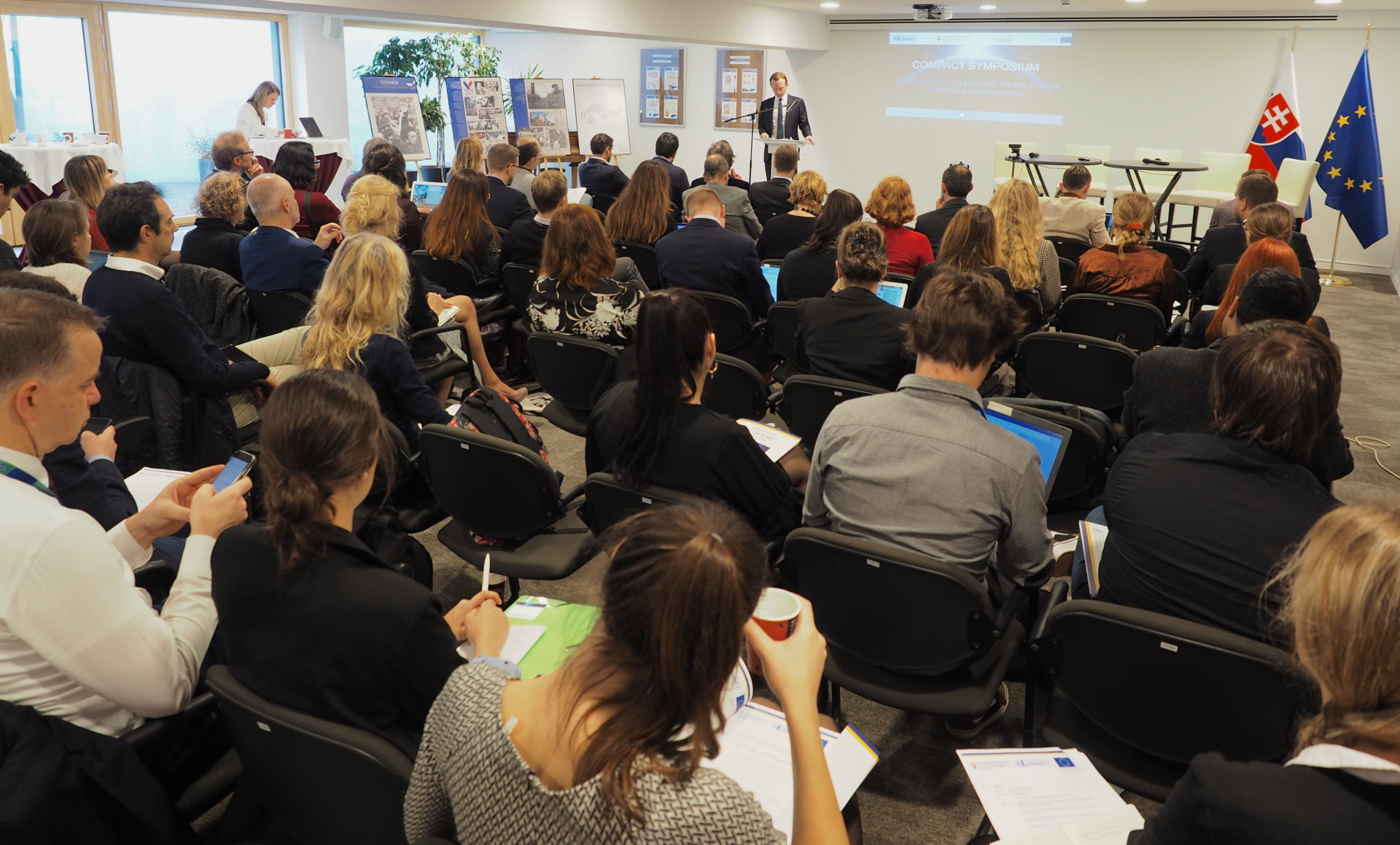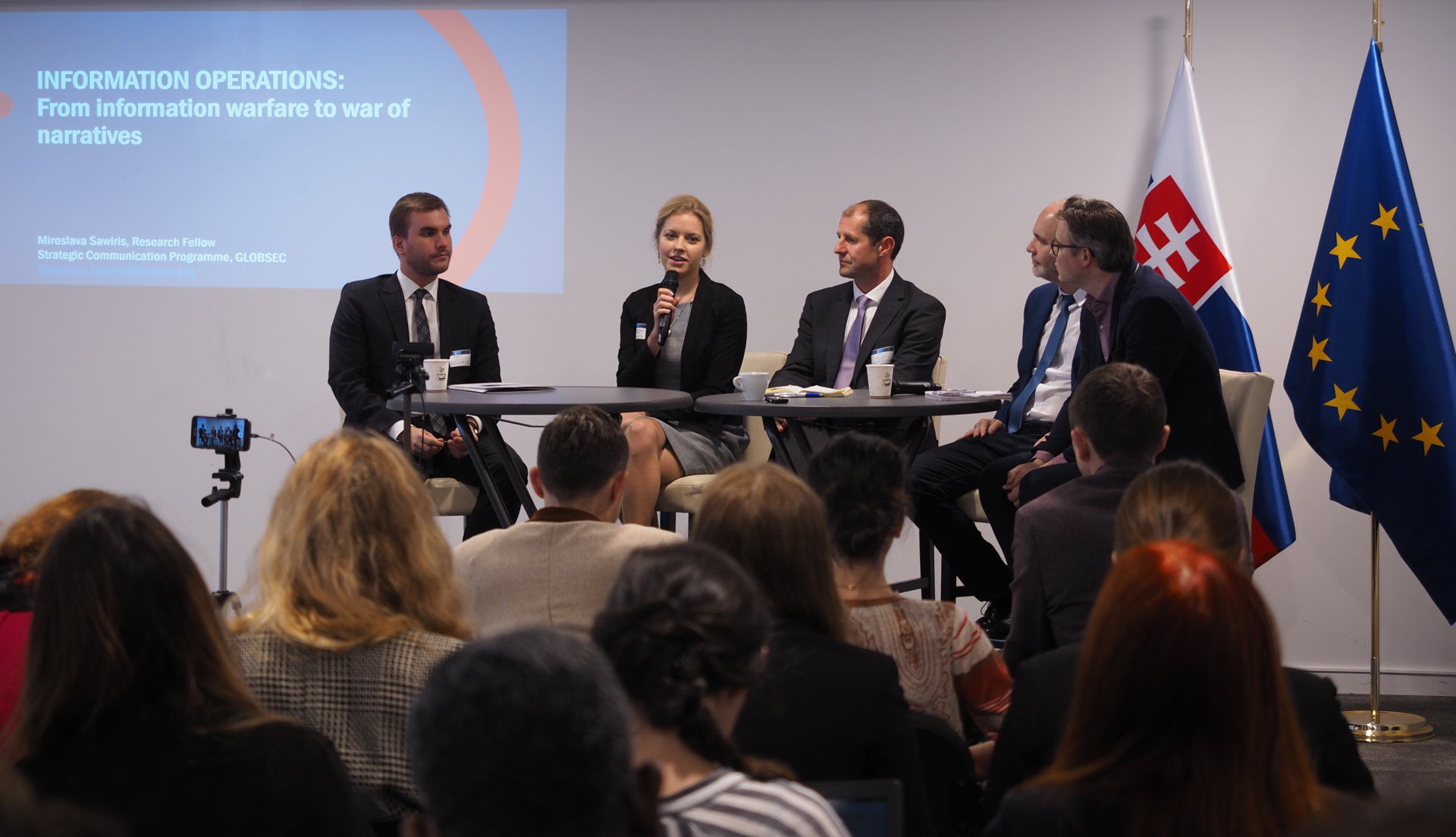
6 minutes
COMPACT SYMPOSIUM: DISINFO IN EU ELECTIONS & THE ROLE OF SOCIAL MEDIA AND TECHNOLOGY TRENDS
The symposium brought together policymakers, academics, NGOs and other stakeholders to discuss how to make social media and our democratic discourses more resilient to extremism and disinformation, especially in light of elections. The aim of the COMPACT
21 October 2019, COMPACT BRUSSELS: Social media have radically changed our ways of interacting and communicating. Companies such as Twitter or Facebook were founded already more than ten years ago. However, even today, we are still struggling to define their impact on public discourse, the media landscape, and our democracies. Phenomena such as fake news, hate speech and disinformation have changed the way people interact online and influence the political discourse. The European Elections in May 2019 have been viewed as a potential target of foreign influence, but also susceptible to the spread of false information and misleading political advertisement from actors within the EU. While traditional national electoral legislations formulate rules about the political advertisement, these rules were developed in a traditional media environment and may not be fit for a changing social media landscape. Therefore, the symposium focused on a set of measures proposed by the European Commission in advance of the elections and tried to evaluate to what extent they were successful. Further, the discussion focused on what else could be done to make sure our electoral system, social media legislation, and online political advertisement are fit for the digital century. Lastly, the preliminary findings from the COMPACT project were presented focusing on technological, regulatory and policy developments in social media and convergence.

COMPACT is a Coordination and Support Action funded European Commission under framework Horizon 2020 the main objective of which is to increase awareness (including scientific, political, cultural, legal, economic and technical areas) of the latest technological discoveries among key stakeholders in the context of social media and convergence. The aim of the COMPACT project is to raise awareness about emerging legal, policy and technological developments and increase the understanding of how the convergence of those trends influences media and society. This symposium was organized by the European DIGITAL SME Alliance as the local partner with support from COMPACT project partners, and kindly hosted by the Slovak Permanent Representation to the European Union. The symposium brought together policymakers, academics, NGOs and other stakeholders to discuss how to make social media and our democratic discourses more resilient to extremism and disinformation, especially in light of elections. The keynote was delivered by HE Tomáš KOZÁK from the Slovak Permanent Representation to the European Union.
Our expert Rasťo Kužel was one of the speakers in the panel titled "What types of threats? Misinformation, disinformation, hacking – who are the players and what to do about those threats? The moderator of the panel was Lutz Güllner, Head of Division Strategic Communications, European External Action Service and other speakers were Miroslava Sawiris, Globsec NGO, Slovakia, Florian Pennings, Cyber Security Policy Manager at Microsoft Brussels, Belgium, and Martin Gajdoš, Slovak Ministry of Interior, Dept. of Elections, Referendum, and Political Parties, Slovakia. The panelists focused on the following questions & challenges:
What threats are we talking about? This session aims to provide an overview on the types of disinformation and misinformation threats in elections, to identify the main players, the role of external influence and populism in Europe.
What types of threats? Misinformation, disinformation, hacking – who are the players and what to do about those threats?
Brief discussion about different types of threats
Who are the actors -within and from the outside?
Information disorder: mis-, dis- and mal-information together represent what is called information disorder. In this sense, each of the information types is defined as follows:
Misinformation is when false information is shared, but no harm is meant by the action.
Disinformation is when false information is knowingly and purposefully shared to cause harm.
Mal-information is when genuine (including private) information is shared to cause harm.

The main takeaways of the symposium compiled by Rasto Kuzel include:
- disinformation is constantly evolving and in general and during the EP elections in particular, we have seen a shift from external to internal actors who spread disinformation
- there is a need to have a multi-stakeholder approach to this issue and a better mapping when it comes to who is doing what
- there is a general problem with access to data (particularly historical data on social media platforms) for researchers and CSOs willing to monitor & analyze social media due to the unwillingness of social media platforms to allow (better or any) access to their APIs.
- when it comes to paid political advertising in online media, there is a problem with the definition of what is paid political online advertising.
- there is a problem in identifying paid content (particularly if it is not properly labeled as paid) and it looks like an organic content - as such, more transparency is needed for content distribution
- there is a need to have more research into online campaigning and campaign expenditures

For more information about the symposium, visit also this website
The agenda of the symposium is here agenda
The presentation of Rasto Kuzel is here rasto-kuzel-memo98
The video recording of the second panel can be found here